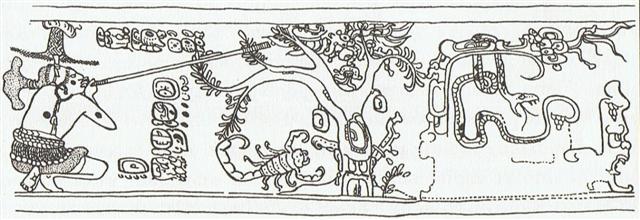3. There could have been a month named toki on Easter Island according to Fischer who refers to Fedorova. I cannot say where in his book this statement is to be found, his index is not very informative, and I rely on my earlier notes. If there was a toki month, it ought to be at the beginning of the year or maybe at the beginning of the 'back side' of the year. Makemson has no list for the month names on Easter Island (and neither for those on Mangareva for that matter). The lists of months according to other Polyesian Islands show no consensus and are therefore not much of a guidance. However, I have tried to 'decipher' the Futuna month names. To open the 'mouth' of the earth god (Geb) in order to let the deceased enter should be an event in the west (and the Egyptians had their graveyard to the west of the Nile). The last regular month on Futuna was Munifa and fa (= ha) means 'to breathe' among other things. 4 (ha) respectively 8 (varu) appear to be connected with 'dismantling' (cfr the process of embalming at rima aueue):
... My little dogs, I get them food, / My little dogs, I get them food, / ha-ahing, ha-ahing, ha-ahing .... To breathe is a sign of life and it comes naturally if you open your mouth, especially if you yawn (ha). To give off heat (ha) is the opposite of being cold and dead. We can guess that important toki sign conveys a similar spectrum of meanings. The end is in time an event close to its opposite. I think that to 'enter or become the sky' (presumably an event in the east) will be accomplished by yet another kind of 'stick', the cosmic 'tree': ... the Palenque scribes repeated Creation again and described it as 'it was made visible, the image at Lying-down-Sky, the First-Three-Stone-Place'. Then we learned that five hundred and forty-two days later (1.9.2 in the Maya system), Hun-Nal-Ye 'entered or became the sky' (och ta chan). This 'entering' event occurred on February 5, 3112 B.C. The act of 'entering the sky' is recorded on another extraordinary painted pot. This pot depicts one of the Hero Twins (One-Ahaw in the Classic texts and One-Hunaphu in the K'iche' Popol Vuh) and a great bird who is trying to land in a huge ceiba tree heavy with fruit. This mythical bird is Itzam-Yeh, Classic prototype of Wuqub-Kaqix, 'Seven-Macaw', of Popol Vuh fame. In that story, in the time before the sky was lifted up to make room for the light, the vainglorious Seven-Macaw imagined himself to be the sun. Offended by his pride, the Hero Twins humbled him by breaking his beautiful shining tooth with a pellet from their blowgun. This pot shows One-Ahaw aiming at the bird as he swoops down to land in his tree. As Itzam-Yeh lands on his perch, the text tells us he is 'entering or becoming the sky'. This particular 'sky-entering' is not the one mentioned in the Palenque text. It is the final event that occurred in the previous creation before the universe was remade. Before the sky could be raised and the real sun revealed in all its splendor, the Hero Twins had to put the false sun, Itzam-Yeh, in his place. If the date on this pot corresponds to that pre-Creation event, as we believe it does, then Itzam-Yeh was defeated in 12.18.4.5.0 1 Ahaw 3 K'ank'in (May 28, 3149 B.C.). After the new universe was finally brought into existence, First Father also entered the sky by landing in the tree, just as Itzam-Yeh did ... |
